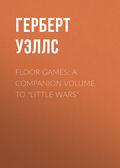
Герберт Джордж Уэллс
Mr. Britling Sees It Through
§ 6
When Mr. Britling, after a strenuous morning among high ideals, descended for lunch, he found Mr. Lawrence Carmine had come over to join him at that meal. Mr. Carmine was standing in the hall with his legs very wide apart reading The Times for the fourth time. "I can do no work," he said, turning round. "I can't fix my mind. I suppose we are going to war. I'd got so used to the war with Germany that I never imagined it would happen. Gods! what a bore it will be… And Maxse and all those scaremongers cock-a-hoop and 'I told you so.' Damn these Germans!"
He looked despondent and worried. He followed Mr. Britling towards the dining-room with his hands deep in his pockets.
"It's going to be a tremendous thing," he said, after he had greeted Mrs. Britling and Hugh and Aunt Wilshire and Teddy, and seated himself at Mr. Britling's hospitable board. "It's going to upset everything. We don't begin to imagine all the mischief it is going to do."
Mr. Britling was full of the heady draught of liberal optimism he had been brewing upstairs. "I am not sorry I have lived to see this war," he said. "It may be a tremendous catastrophe in one sense, but in another it is a huge step forward in human life. It is the end of forty years of evil suspense. It is crisis and solution."
"I wish I could see it like that," said Mr. Carmine.
"It is like a thaw – everything has been in a frozen confusion since that Jew-German Treaty of Berlin. And since 1871."
"Why not since Schleswig-Holstein?" said Mr. Carmine.
"Why not? Or since the Treaty of Vienna?"
"Or since – One might go back."
"To the Roman Empire," said Hugh.
"To the first conquest of all," said Teddy…
"I couldn't work this morning," said Hugh. "I have been reading in the Encyclopædia about races and religions in the Balkans… It's very mixed."
"So long as it could only be dealt with piecemeal," said Mr. Britling. "And that is just where the tremendous opportunity of this war comes in. Now everything becomes fluid. We can redraw the map of the world. A week ago we were all quarrelling bitterly about things too little for human impatience. Now suddenly we face an epoch. This is an epoch. The world is plastic for men to do what they will with it. This is the end and the beginning of an age. This is something far greater than the French Revolution or the Reformation… And we live in it…"
He paused impressively.
"I wonder what will happen to Albania?" said Hugh, but his comment was disregarded.
"War makes men bitter and narrow," said Mr. Carmine.
"War narrowly conceived," said Mr. Britling. "But this is an indignant and generous war."
They speculated about the possible intervention of the United States. Mr. Britling thought that the attack on Belgium demanded the intervention of every civilised power, that all the best instincts of America would be for intervention. "The more," he said, "the quicker."
"It would be strange if the last power left out to mediate were to be China," said Mr. Carmine. "The one people in the world who really believe in peace… I wish I had your confidence, Britling."
For a time they contemplated a sort of Grand Inquest on Germany and militarism, presided over by the Wisdom of the East. Militarism was, as it were, to be buried as a suicide at four cross-roads, with a stake through its body to prevent any untimely resuscitation.
§ 7
Mr. Britling was in a phase of imaginative release. Such a release was one of the first effects of the war upon many educated minds. Things that had seemed solid forever were visibly in flux; things that had seemed stone were alive. Every boundary, every government, was seen for the provisional thing it was. He talked of his World Congress meeting year by year, until it ceased to be a speculation and became a mere intelligent anticipation; he talked of the "manifest necessity" of a Supreme Court for the world. He beheld that vision at the Hague, but Mr. Carmine preferred Delhi or Samarkand or Alexandria or Nankin. "Let us get away from the delusion of Europe anyhow," said Mr. Carmine…
As Mr. Britling had sat at his desk that morning and surveyed the stupendous vistas of possibility that war was opening, the catastrophe had taken on a more and more beneficial quality. "I suppose that it is only through such crises as these that the world can reconstruct itself," I said. And, on the whole that afternoon he was disposed to hope that the great military machine would not smash itself too easily. "We want the nations to feel the need of one another," he said. "Too brief a campaign might lead to a squabble for plunder. The Englishman has to learn his dependence on the Irishman, the Russian has to be taught the value of education and the friendship of the Pole… Europe will now have to look to Asia, and recognise that Indians and Chinamem are also 'white.'… But these lessons require time and stresses if they are to be learnt properly…"
They discussed the possible duration of the war.
Mr. Carmine thought it would be a long struggle; Mr. Britling thought that the Russians would be in Berlin by the next May. He was afraid they might get there before the end of the year. He thought that the Germans would beat out their strength upon the French and Belgian lines, and never be free to turn upon the Russian at all. He was sure they had underrated the strength and energy of the French and of ourselves. "The Russians meanwhile," he said, "will come on, slowly, steadily, inevitably…"
§ 8
That day of vast anticipations drew out into the afternoon. It was a day – obsessed. It was the precursor of a relentless series of doomed and fettered days. There was a sense of enormous occurrences going on just out of sound and sight – behind the mask of Essex peacefulness. From this there was no escape. It made all other interests fitful. Games of Badminton were begun and abruptly truncated by the arrival of the evening papers; conversations started upon any topic whatever returned to the war by the third and fourth remark…
After lunch Mr. Britling and Mr. Carmine went on talking. Nothing else was possible. They repeated things they had already said. They went into things more thoroughly. They sat still for a time, and then suddenly broke out with some new consideration…
It had been their custom to play skat with Herr Heinrich, who had shown them the game very explicitly and thoroughly. But there was no longer any Herr Heinrich – and somehow German games were already out of fashion. The two philosophers admitted that they had already considered skat to be complicated without subtlety, and that its chief delight for them had been the pink earnestness of Herr Heinrich, his inability to grasp their complete but tacit comprehension of its innocent strategy, and his invariable ill-success to bring off the coups that flashed before his imagination.
He would survey the destructive counter-stroke with unconcealed surprise. He would verify his first impression by craning towards it and adjusting his glasses on his nose. He had a characteristic way of doing this with one stiff finger on either side of his sturdy nose.
"It is very fortunate for you that you have played that card," he would say, growing pinker and pinker with hasty cerebration. "Or else – yes" – a glance at his own cards – "it would have been altogether bad for you. I had taken only a very small risk… Now I must – "
He would reconsider his hand.
"Zo!" he would say, dashing down a card…
Well, he had gone and skat had gone. A countless multitude of such links were snapping that day between hundreds of thousands of English and German homes.
§ 9
The imminence of war produced a peculiar exaltation in Aunt Wilshire. She developed a point of view that was entirely her own.
It was Mr. Britling's habit, a habit he had set himself to acquire after much irritating experience, to disregard Aunt Wilshire. She was not, strictly speaking, his aunt; she was one of those distant cousins we find already woven into our lives when we attain to years of responsibility. She had been a presence in his father's household when Mr. Britling was a boy. Then she had been called "Jane," or "Cousin Jane," or "Your cousin Wilshire." It had been a kindly freak of Mr. Britling's to promote her to Aunty rank.
She eked out a small inheritance by staying with relatives. Mr. Britling's earlier memories presented her as a slender young woman of thirty, with a nose upon which small boys were forbidden to comment. Yet she commented upon it herself, and called his attention to its marked resemblance to that of the great Duke of Wellington. "He was, I am told," said Cousin Wilshire to the attentive youth, "a great friend of your great-grandmother's. At any rate, they were contemporaries. Since then this nose has been in the family. He would have been the last to draw a veil over it, but other times, other manners. 'Publish,' he said, 'and be damned.'"
She had a knack of exasperating Mr. Britling's father, a knack which to a less marked degree she also possessed in relation to the son. But Mr. Britling senior never acquired the art of disregarding her. Her method – if one may call the natural expression of a personality a method – was an invincibly superior knowledge, a firm and ill-concealed belief that all statements made in her hearing were wrong and most of them absurd, and a manner calm, assured, restrained. She may have been born with it; it is on record that at the age of ten she was pronounced a singularly trying child. She may have been born with the air of thinking the doctor a muff and knowing how to manage all this business better. Mr. Britling had known her only in her ripeness. As a boy, he had enjoyed her confidences – about other people and the general neglect of her advice. He grew up rather to like her – most people rather liked her – and to attach a certain importance to her unattainable approval. She was sometimes kind, she was frequently absurd…
With very little children she was quite wise and Jolly…
So she circulated about a number of houses which at any rate always welcomed her coming. In the opening days of each visit she performed marvels of tact, and set a watch upon her lips. Then the demons of controversy and dignity would get the better of her. She would begin to correct, quietly but firmly, she would begin to disapprove of the tone and quality of her treatment. It was quite common for her visit to terminate in speechless rage both on the side of host and of visitor. The remarkable thing was that this speechless rage never endured. Though she could exasperate she could never offend. Always after an interval during which she was never mentioned, people began to wonder how Cousin Jane was getting on… A tentative correspondence would begin, leading slowly up to a fresh invitation.
She spent more time in Mr. Britling's house than in any other. There was a legend that she had "drawn out" his mind, and that she had "stood up" for him against his father. She had certainly contradicted quite a number of those unfavourable comments that fathers are wont to make about their sons. Though certainly she contradicted everything. And Mr. Britling hated to think of her knocking about alone in boarding-houses and hydropathic establishments with only the most casual chances for contradiction.
Moreover, he liked to see her casting her eye over the morning paper. She did it with a manner as though she thought the terrestrial globe a great fool, and quite beyond the reach of advice. And as though she understood and was rather amused at the way in which the newspaper people tried to keep back the real facts of the case from her.
And now she was scornfully entertained at the behaviour of everybody in the war crisis.
She confided various secrets of state to the elder of the younger Britlings – preferably when his father was within earshot.
"None of these things they are saying about the war," she said, "really matter in the slightest degree. It is all about a spoilt carpet and nothing else in the world – a madman and a spoilt carpet. If people had paid the slightest attention to common sense none of this war would have happened. The thing was perfectly well known. He was a delicate child, difficult to rear and given to screaming fits. Consequently he was never crossed, allowed to do everything. Nobody but his grandmother had the slightest influence with him. And she prevented him spoiling this carpet as completely as he wished to do. The story is perfectly well known. It was at Windsor – at the age of eight. After that he had but one thought: war with England…
"Everybody seemed surprised," she said suddenly at tea to Mr. Carmine. "I at least am not surprised. I am only surprised it did not come sooner. If any one had asked me I could have told them, three years, five years ago."
The day was one of flying rumours, Germany was said to have declared war on Italy, and to have invaded Holland as well as Belgium.
"They'll declare war against the moon next!" said Aunt Wilshire.
"And send a lot of Zeppelins," said the smallest boy. "Herr Heinrich told us they can fly thousands of miles."
"He will go on declaring war until there is nothing left to declare war against. That is exactly what he has always done. Once started he cannot desist. Often he has had to be removed from the dinner-table for fear of injury. Now, it is ultimatums."
She was much pleased by a headline in the Daily Express that streamed right across the page: "The Mad Dog of Europe." Nothing else, she said, had come so near her feelings about the war.
"Mark my words," said Aunt Wilshire in her most impressive tones. "He is insane. It will be proved to be so. He will end his days in an asylum – as a lunatic. I have felt it myself for years and said so in private… Knowing what I did… To such friends as I could trust not to misunderstand me… Now at least I can speak out.
"With his moustaches turned up!" exclaimed Aunt Wilshire after an interval of accumulation… "They say he has completely lost the use of the joint in his left arm, he carries it stiff like a Punch and Judy – and he wants to conquer Europe… While his grandmother lived there was some one to keep him in order. He stood in Awe of her. He hated her, but he did not dare defy her. Even his uncle had some influence. Now, nothing restrains him.
"A double-headed mad dog," said Aunt Wilshire. "Him and his eagles!.. A man like that ought never to have been allowed to make a war… Not even a little war… If he had been put under restraint when I said so, none of these things would have happened. But, of course I am nobody… It was not considered worth attending to."
§ 10
One remarkable aspect of the English attitude towards the war was the disposition to treat it as a monstrous joke. It is a disposition traceable in a vast proportion of the British literature of the time. In spite of violence, cruelty, injustice, and the vast destruction and still vaster dangers of the struggles, that disposition held. The English mind refused flatly to see anything magnificent or terrible in the German attack, or to regard the German Emperor or the Crown Prince as anything more than figures of fun. From first to last their conception of the enemy was an overstrenuous, foolish man, red with effort, with protruding eyes and a forced frightfulness of demeanour. That he might be tremendously lethal did not in the least obscure the fact that he was essentially ridiculous. And if as the war went on the joke grew grimmer, still it remained a joke. The German might make a desert of the world; that could not alter the British conviction that he was making a fool of himself.
And this disposition kept coming to the surface throughout the afternoon, now in a casual allusion, now in some deliberate jest. The small boys had discovered the goose step, and it filled their little souls with amazement and delight. That human beings should consent to those ridiculous paces seemed to them almost incredibly funny. They tried it themselves, and then set out upon a goose-step propaganda. Letty and Cissie had come up to the Dower House for tea and news, and they were enrolled with Teddy and Hugh. The six of them, chuckling and swaying, marched, in vast scissor strides across the lawn. "Left," cried Hugh. "Left."
"Toes out more," said Mr. Lawrence Carmine.
"Keep stiffer," said the youngest Britling.
"Watch the Zeppelins and look proud," said Hugh. "With the chest out. Zo!"
Mrs. Britling was so much amused that she went in for her camera, and took a snapshot of the detachment. It was a very successful snapshot, and a year later Mr. Britling was to find a print of it among his papers, and recall the sunshine and the merriment…
§ 11
That night brought the British declaration of war against Germany. To nearly every Englishman that came as a matter of course, and it is one of the most wonderful facts in history that the Germans were surprised by it. When Mr. Britling, as a sample Englishman, had said that there would never be war between Germany and England, he had always meant that it was inconceivable to him that Germany should ever attack Belgium or France. If Germany had been content to fight a merely defensive war upon her western frontier and let Belgium alone, there would scarcely have been such a thing as a war party in Great Britain. But the attack upon Belgium, the westward thrust, made the whole nation flame unanimously into war. It settled a question that was in open debate up to the very outbreak of the conflict. Up to the last the English had cherished the idea that in Germany, just as in England, the mass of people were kindly, pacific, and detached. That had been the English mistake. Germany was really and truly what Germany had been professing to be for forty years, a War State. With a sigh – and a long-forgotten thrill – England roused herself to fight. Even now she still roused herself sluggishly. It was going to be an immense thing, but just how immense it was going to be no one in England had yet imagined.
Countless men that day whom Fate had marked for death and wounds stared open-mouthed at the news, and smiled with the excitement of the headlines, not dreaming that any of these things would come within three hundred miles of them. What was war to Matching's Easy – to all the Matching's Easies great and small that make up England? The last home that was ever burnt by an enemy within a hundred miles of Matching's Easy was burnt by the Danes rather more than a thousand years ago… And the last trace of those particular Danes in England were certain horny scraps of indurated skin under the heads of the nails in the door of St. Clement Danes in London…
Now again, England was to fight in a war which was to light fires in England and bring death to English people on English soil. There were inconceivable ideas in August, 1914. Such things must happen before they can be comprehended as possible.
§ 12
This story is essentially the history of the opening and of the realisation of the Great War as it happened to one small group of people in Essex, and more particularly as it happened to one human brain. It came at first to all these people in a spectacular manner, as a thing happening dramatically and internationally, as a show, as something in the newspapers, something in the character of an historical epoch rather than a personal experience; only by slow degrees did it and its consequences invade the common texture of English life. If this story could be represented by sketches or pictures the central figure would be Mr. Britling, now sitting at his desk by day or by night and writing first at his tract "And Now War Ends" and then at other things, now walking about his garden or in Claverings park or going to and fro in London, in his club reading the ticker or in his hall reading the newspaper, with ideas and impressions continually clustering, expanding, developing more and more abundantly in his mind, arranging themselves, reacting upon one another, building themselves into generalisations and conclusions…
All Mr. Britling's mental existence was soon threaded on the war. His more or less weekly Times leader became dissertations upon the German point of view; his reviews of books and Literary Supplement articles were all oriented more and more exactly to that one supreme fact…
It was rare that he really seemed to be seeing the war; few people saw it; for most of the world it came as an illimitable multitude of incoherent, loud, and confusing impressions. But all the time he was at least doing his utmost to see the war, to simplify it and extract the essence of it until it could be apprehended as something epic and explicable, as a stateable issue…
Most typical picture of all would be Mr. Britling writing in a little circle of orange lamplight, with the blinds of his room open for the sake of the moonlight, but the window shut to keep out the moths that beat against it. Outside would be the moon and the high summer sky and the old church tower dim above the black trees half a mile away, with its clock – which Mr. Britling heard at night but never noted by day – beating its way round the slow semicircle of the nocturnal hours. He had always hated conflict and destruction, and felt that war between civilised states was the quintessential expression of human failure, it was a stupidity that stopped progress and all the free variation of humanity, a thousand times he had declared it impossible, but even now with his country fighting he was still far from realising that this was a thing that could possibly touch him more than intellectually. He did not really believe with his eyes and finger-tips and backbone that murder, destruction, and agony on a scale monstrous beyond precedent was going on in the same world as that which slumbered outside the black ivy and silver shining window-sill that framed his peaceful view.
War had not been a reality of the daily life of England for more than a thousand years. The mental habit of the nation for fifty generations was against its emotional recognition. The English were the spoilt children of peace. They had never been wholly at war for three hundred years, and for over eight hundred years they had not fought for life against a foreign power. Spain and France had threatened in turn, but never even crossed the seas. It is true that England had had her civil dissensions and had made wars and conquests in every part of the globe and established an immense empire, but that last, as Mr. Britling had told Mr. Direck, was "an excursion." She had just sent out younger sons and surplus people, emigrants and expeditionary forces. Her own soil had never seen any successful foreign invasion; her homeland, the bulk of her households, her general life, had gone on untouched by these things. Nineteen people out of twenty, the middle class and most of the lower class, knew no more of the empire than they did of the Argentine Republic or the Italian Renaissance. It did not concern them. War that calls upon every man and threatens every life in the land, war of the whole national being, was a thing altogether outside English experience and the scope of the British imagination. It was still incredible, it was still outside the range of Mr. Britling's thoughts all through the tremendous onrush and check of the German attack in the west that opened the great war. Through those two months he was, as it were, a more and more excited spectator at a show, a show like a baseball match, a spectator with money on the event, rather than a really participating citizen of a nation thoroughly at war…







